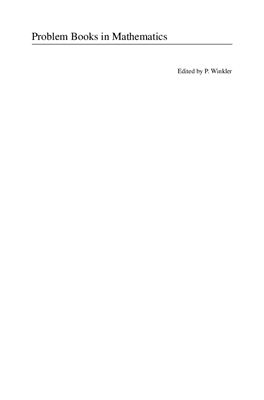Springer, 2007. - 124 pages.
The present book is based on the view that cognitive skills are best acquired by solving challenging, non-standard probability problems. The author's own experience, both in leaing and in teaching, is that challenging problems often provide more, and longer lasting, inductive insights than plain-style deductions from general concepts. Problems help to develop, and to sharpen our intuition for important probabilistical concepts and tools such as conditionaing or first-step analyses.
Many puzzles and problems presented here are either new within a problem solving context (although as topics in fundamental research they are of course long known) or are variations of classical problems which follow directly from elementary concepts. A small number of particularly instructive problems is taken from previous sources which in this case are generally given.
The present book is based on the view that cognitive skills are best acquired by solving challenging, non-standard probability problems. The author's own experience, both in leaing and in teaching, is that challenging problems often provide more, and longer lasting, inductive insights than plain-style deductions from general concepts. Problems help to develop, and to sharpen our intuition for important probabilistical concepts and tools such as conditionaing or first-step analyses.
Many puzzles and problems presented here are either new within a problem solving context (although as topics in fundamental research they are of course long known) or are variations of classical problems which follow directly from elementary concepts. A small number of particularly instructive problems is taken from previous sources which in this case are generally given.

